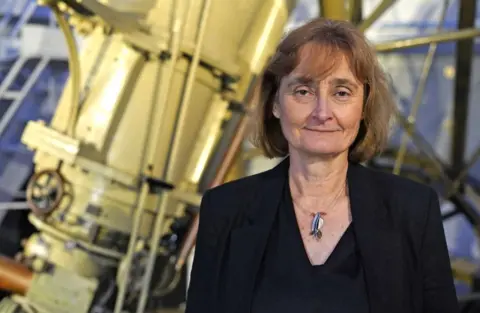The United Kingdom has achieved a historical milestone with the appointment of Professor Michele Dougherty as its first female Astronomer Royal, marking a significant shift in a position that has existed for 350 years. Traditionally, this prestigious role has been held exclusively by males since its inception, during a time when the Royal Observatory in Greenwich was established back in 1675. As the inaugural woman to assume this role, Professor Dougherty serves as an official advisor to King Charles III on astronomical matters, breaking barriers and paving the way for future generations of women in the field of science.
In her role, Professor Dougherty, a noted scientist and specialist in planetary science, aims to inspire many women and girls to not only pursue careers in the sciences but also to broaden public engagement with astronomy. Her enthusiasm stems from a childhood fascination with celestial bodies, which was ignited when she utilized her father’s telescope. Despite not taking science courses during secondary school in South Africa, she excelled in mathematics, ultimately gaining admission to a university science program. Her journey illustrates a remarkable story of perseverance and inspiration in the face of systemic challenges.
In her first address following this groundbreaking appointment, Professor Dougherty expressed her hopes for increased visibility regarding women in science, stating, “I want to engage with the public, excite them about what we do in astronomy, but also make it clear how important what we do is to the UK economy.” She emphasizes the economic relevance of the scientific field, wanting the public to understand that what is often seen as abstract or distant has tangible impacts on the economy and society.
Dougherty’s involvement in a European Space Agency mission to explore the icy moons of Jupiter positions her as part of one of the most significant ongoing space endeavors. During her reflections, she added a light tone, humorously reacting to the possibilities of extraterrestrial life lurking in our solar system as she recalls her own call to adventure—observing Jupiter through a telescope at the tender age of ten. She continues to express amazement at her career trajectory, noting how surreal it feels to hold the title of Astronomer Royal.
The evolution of the Astronomer Royal role mirrors broader shifts in the scientific landscape. Historically tasked with advising the monarchy on navigational challenges, the responsibilities of the position have expanded to include recommendations on a variety of scientific matters, advancing international collaboration in research and astronomy. This metamorphosis reflects the world’s growing intersection of science and global collaboration, a testament to the changing face of the scientific community.
As the first female to hold this position in Britain, Dougherty’s appointment is not just a personal achievement but a moment for collective celebration within the scientific community. Her counterpart in Scotland, Professor Catherine Heyman, also commended Dougherty’s appointment, highlighting that such changes might not only alter perceptions within the scientific field but also encourage diversity and innovation as the scientific community grapples with pressing global questions.
Finally, Dougherty believes that her visibility as the first woman in such a prominent scientific role can inspire young girls contemplating their futures. She recounted experiences during her tenure as head of the physics department at Imperial College, where there was a notable increase in the percentage of female undergraduates pursuing physics. Dougherty’s journey is a source of hope and motivation for many, indicating that barriers can indeed be broken, highlighting the necessity and importance of representation in all fields of science. As she embarks on this pivotal role, the expectations grow—not only to advance scientific inquiry but to reshape the narrative around women in science for generations to come.












